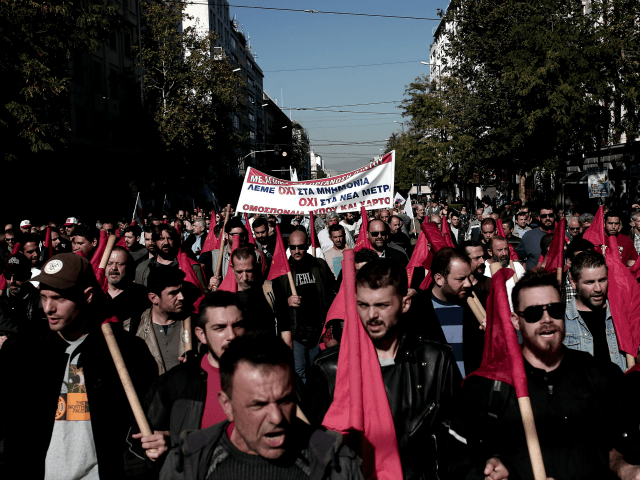Greek unions are holding their second general strike in less than a month Thursday, this time against a planned social security overhaul that could enforce new pension cuts.
The labour ministry is working on a new system under which state-guaranteed pensions will be reportedly cut by half — to a minimum of 384 euros — and the rest will depend on a person’s income and years of social security payments.
The strike will shut down public services, trains and shipping while hospitals will operate with emergency staff.
Lawyers and teachers are also participating in the walkout. Journalists went on a solidarity strike on Wednesday.
The government of Prime Minister Alexis Tsipras has already been weakened by its decision in July to accept a third EU bailout with strict austerity conditions in order to avoid a Greek exit from the euro.
Tsipras’ leftist-nationalist coalition in November saw its parliamentary majority whittled to 153 deputies in the 300-seat parliament after a divisive vote on home foreclosures, another measure demanded by its international creditors.
By subscribing, you agree to our terms of use & privacy policy. You will receive email marketing messages from Breitbart News Network to the email you provide. You may unsubscribe at any time.
Another general strike was held November 12 against the bailout and accompanying tax hikes.
Over 20,000 people demonstrated in Athens at the time, and sporadic violence broke out between police and hooded youths who vandalised public property.
Despite his narrow parliamentary majority, Tsipras on Tuesday dismissed suggestions that his government is on its last legs.
“Dogs howl but the caravan goes on,” Tsipras told his lawmakers.
“We will endure and achieve our targets. The people will judge us at the end of our term…in the autumn of 2019,” the 41-year-old PM said.
He stressed that Syriza has won three successive ballots since 2014, not counting a referendum against austerity in July.
Officially, Tsipras’ Syriza party applauds strike action against the EU bailout, which the PM has called a “tactical retreat.”
Nikolaos Adamopoulos, head of the leading civil servants’ union Adedy, says opposition to the bailouts has already brought down three governments, suggesting a similar fate for Tsipras.
“There will be a rearrangement in the political scene. There may be a majority in parliament in favour of the bailout but this is not reflected in society,” Adamopoulos told AFP.
“The people do not trust parties, they showed it in the last election,” Adamopoulos said.
In the September election, nearly one in two eligible Greeks — 44 per cent — did not turn up to vote.

COMMENTS
Please let us know if you're having issues with commenting.